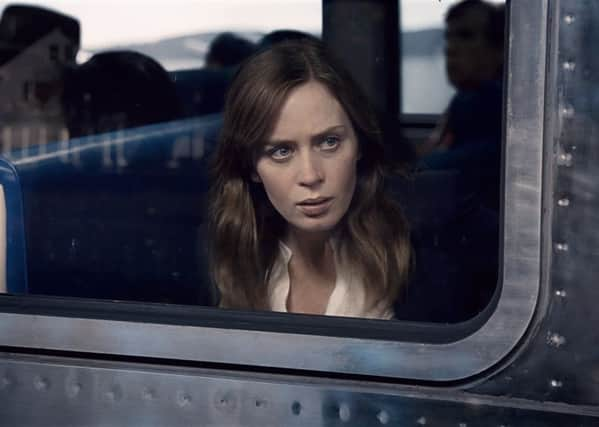Film reviews: The Girl on the Train | War on Everyone | My Scientology Movie


Having sold ten million copies worldwide, Paula Hawkins’ 2014 British thriller The Girl on the Train is a genuine publishing phenomenon, despite being little more than a second-rate riff on Gone Girl. Sadly, this rapidly cranked-out film version doesn’t even have that going for it. Where the book was pacy enough to distract attention from how derivative its title, its structure and its themes all felt, the film – directed by The Help’s Tate Taylor and adapted by Erin Cressida Wilson – has all the cinematic sophistication of a cheap TV drama, one that manages to squander Emily Blunt – cast as Rachel, the book’s titular heroine – by failing to come up with an interesting take on her character’s status as an alcoholic prone to blackouts.
The Girl on the Train (15) **
War on Everyone (15) ***
My Scientology Movie (15) ****
That’s a potentially fascinating character to have at the centre of a mystery built around the disappearance of a woman she sees every day on her commute into the city. Instead of coming up with a dramatically interesting way to address the problem of how to tell the story from her unreliable perspective, though, the film has Blunt deliver reams of voice-over narration, then replicates in a very clunky way the book’s trick of jumping between three different timelines and the points of view of three different characters.
Advertisement
Hide AdIndeed, beyond the story being transposed from London’s commuter belt to New York’s (another big mistake: Rachel’s train rides have none of the cramped, depressing monotony of daily commuter life in the UK), the film does nothing innovative with its source material: it simply streamlines the plot to a manageable length without bothering to flesh out any of the characters. Rachel’s status as a sad, lonely, childless woman daydreaming about the perfect life she lost after her husband (Justin Theroux) strayed isn’t made very compelling. She rides past her old house every day on her commute into a non-existent job, but so what? The world she sees from the train is oddly rendered on screen, full of scenes of acrobatic kitchen sex that bring to mind laughably bad erotic thrillers.
The film’s biggest failing is its inability to use Rachel’s blackouts to keep us in the dark about what she’s witnessed. As we start seeing the world from the point of view of her ex-husband’s new wife (Rebecca Ferguson) and the young woman (Hayley Bennett) who lives a few doors down and who promptly goes missing, the whole thing becomes a fairly tedious procedural with an easily guessable twist. This may be called The Girl on the Train, but in every other way it’s pedestrian.
As the director of The Guard and Calvary, John Michael McDonagh has always come across as willfully obnoxious, someone going out of his way to muscle in on the limelight attained by his more artistically revered brother, In Bruges writer/director Martin McDonagh. Well, that obnoxiousness pays off with War on Everyone, a deliberately shallow, callow and over-the-top buddy cop comedy that has almost no redeeming features beyond providing empty entertainment for a couple of hours, which it mostly excels at doing. Alexander Skarsgård and Michael Peña star as Terry and Bob, a couple of Bad Lieutenant-types who drink and take drugs on the job and think nothing of beating suspects to a pulp when the crime doesn’t demand it. They’re reprehensible in any real sense, but hilarious in this heightened movie world, which comes populated with a raft of quirky supporting players, all participating in a shaggy-dog plot involving a million-dollar heist. In some respects this is McDonagh responding yet again to his brother’s work, most notably his first American feature Seven Psychopaths, albeit in a way that’s much more content to exploit the freedoms of the genre than interrogate them. It’s not done with as much verve as Shane Black’s The Nice Guys, but is fun all the same.
Louis Theroux has been trying for years to make a documentary about the Church of Scientology but has never been able to get past the door to be able to offer more than the usual talking-head-style exploration of the inner-workings of the secretive and ultra-defensive cult religion. With Alex Gibney’s Going Clear already providing an exhaustive examination of the church using that approach, Theroux has hit upon a more unusual approach with My Scientology Movie, a film influenced by Joshua Oppenheimer’s groundbreaking The Act of Killing, but making the most of his own amiable, ultra-polite interview style to let the representatives from the church reveal more about the organisation than they’d ideally like.
With the help of former Scientology enforcer-turned-whistleblower Marty Rathbun – who also featured in Going Clear – Theroux sets out to recreate the alleged practices that have encouraged people to become members over the years but have also led to multiple charges of abuse being levelled against the organisation in general and its leader, David Miscavige, in particular. Hiring actors to play Miscavige, various scientology founders and the church’s poster boy Tom Cruise, the act of recreating on film various scenarios using verbatim transcripts of scientology events helps illuminate some of the bizarre sounding practices and also gets under the skin of Rathbun a little more, holding him to account for the practices the ex-member put into place. But it’s when the church starts making its own film about Theroux that it exposes how paranoid it is as an organisation as various high-level flunkies meet their match in Theroux’s calm, collected and actually very respectful approach.